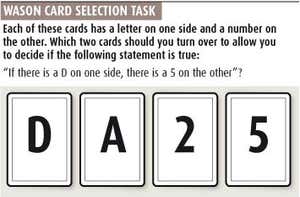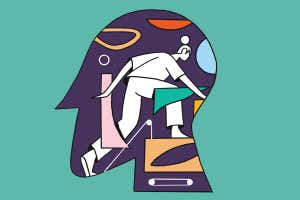
Whether It’s Choosing Between A Long Weekend In Paris Or A Trip To The Ski Slopes, A New Car Versus A Bigger House, Or Even Who To Marry, Almost Every Decision We Make Entails Predicting The Future.

Yet Gilbert And His Colleagues Have Recently Shown That While Loss Aversion Affected People’s Choices, When They Did Lose They Found It Much Less Painful Than They Had Anticipated ( Psychological Science, Vol 17, P 649).
Janine Willis And Alexander Todorov From Princeton University Found That We Make Judgements About A Person’s Trustworthiness, Competence, Aggressiveness, Likeability And Attractiveness Within The First 100 Milliseconds Of Seeing A New Face.
At Times Like These, You May Be Better Off Avoiding Conscious Deliberation And Instead Leave The Decision To Your Unconscious Brain, As Research By Ap Dijksterhuis And Colleagues From The University Of Amsterdam In The Netherlands Shows ( Science, Vol 311, P 1005).
Neurobiologist Antonio Damasio From The University Of Southern California In Los Angeles Has Studied People With Damage To Only The Emotional Parts Of Their Brains, And Found That They Were Crippled By Indecision, Unable To Make Even The Most Basic Choices, Such As What To Wear Or Eat.
Daniel Fessler And Colleagues From The University Of California, Los Angeles, Induced Anger In A Group Of Subjects By Getting Them To Write An Essay Recalling An Experience That Made Them See Red.
In Another Experiment, Fessler And Colleague Kevin Haley Discovered That Angry People Were Less Generous In The Ultimatum Game – In Which One Person Is Given A Sum Of Money And Told To Share It With An Anonymous Partner, Who Must Accept The Offer Otherwise Neither Gets Anything.
A Third Study By Nitika Garg, Jeffrey Inman And Vikas Mittal From The University Of Chicago Found That Angry Consumers Were More Likely To Opt For The First Thing They Were Offered Rather Than Considering Other Alternatives.
Thalia Wheatley From The National Institutes Of Health In Bethesda, Maryland, And Jonathan Haidt From The University Of Virginia, Used Hypnosis To Induce Disgust In Response To Arbitrary Words, Then Asked People To Rate The Moral Status Of Various Actions, Including Incest Between Cousins, Eating One’s Dog And Bribery.
In The Most Extreme Example, People Who Had Read A Word That Cued Disgust Went So Far As To Express Moral Censure Of Blameless Dan, A Student Councillor Who Was Merely Organising Discussion Meetings ( Psychological Science, Vol 16, P 780).
Our Tendency To Overestimate The Extent To Which Other People’s Judgement Is Affected By The Confirmation Bias, While Denying It In Ourselves, Makes Matters Worse ( Trends In Cognitive Sciences, Vol 11, P 37).
In A Classic Study That Introduced This So-called “anchoring Effect”, Kahneman And The Late Amos Tversky Asked Participants To Spin A “wheel Of Fortune” With Numbers Ranging From 0 To 100, And Afterwards To Estimate What Percentage Of United Nations Countries Were African.
In The 1970s, The British And French Governments Fell For It When They Continued Investing Heavily In The Concorde Project Well Past The Point When It Became Clear That Developing The Aircraft Was Not Economically Justifiable.
In A Study Published Last Year, Benedetto De Martino And Ray Dolan From University College London Used Functional MRI To Probe The Brain’s Response To Framing Effects ( Science, Vol 313, P 660).
Countless Experiments Have Revealed That Even The Most Normal, Well-adjusted People Can Be Swayed By Figures Of Authority And Their Peers To Make Terrible Decisions ( New Scientist, 14 April, P 42).
These Effects Help Explain All Sorts Of Choices We Might Think Are Unwise, From The Dangerous Antics Of Gangs Of Teenage Boys To The Radicalism Of Some Animal-rights Activists And Cult Members.
In A Recent Experiment Researchers Led By Robert Cialdini Of Arizona State University In Tempe Looked At Ways To Promote Environmentally Friendly Choices.
It Makes Greater Demands On Your Information-processing Skills, And The Process Can Be Confusing, Time-consuming And At Worst Can Lead To Paralysis: You Spend So Much Time Weighing Up The Alternatives That You End Up Doing Nothing.
“If You’re Out To Find ‘good Enough’, A Lot Of The Pressure Is Off And The Task Of Choosing Something In The Sea Of Limitless Choice Becomes More Manageable,” Says Barry Schwartz, A Psychologist At Swarthmore College, Pennsylvania.
When He Investigated Maximising And Satisficing Strategies Among College Leavers Entering The Job Market, He Found That Although Maximisers Ended Up In Jobs With An Average Starting Salary 20 Per Cent Higher Than Satisficers, They Were Actually Less Satisfied.